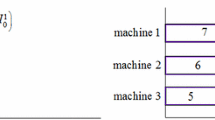Abstract
A two-agent scheduling problem on parallel machines is considered. Our objective is to minimize the makespan for agent A, subject to an upper bound on the makespan for agent B. When the number of machines, denoted by \(m\), is chosen arbitrarily, we provide an \(O(n)\) algorithm with performance ratio \(2-\frac{1}{m}\), i.e., the makespan for agent A given by the algorithm is no more than \(2-\frac{1}{m}\) times the optimal value, while the makespan for agent B is no more than \(2-\frac{1}{m}\) times the threshold value. This ratio is proved to be tight. Moreover, when \(m=2\), we present an \(O(nlogn)\) algorithm with performance ratio \(\frac{1+\sqrt{17}}{4}\approx 1.28\) which is smaller than \(\frac{3}{2}\). The ratio is weakly tight.






Similar content being viewed by others
References
Agnetis A, Mirchandani PB, Pacciarelli D, Pacifici A (2004) Scheduling problem with two competing agents. Oper Res 52:229–242
Agnetis A, Pacciarelli D, Pacifici A (2007) Multi-agent single machine scheduling. Ann Oper Res 150:3–15
Agnetis A, Pascale G, Pacciarelli D (2009) A Lagrangian approach to single-machine scheduling problems with two competing agents. J Sched 12:401–415
Brewer PJ, Plott CR (1996) A binary conflict ascending price (BICAP) mechanism for the decentralized allocation of the right to use railroad tracks. Int J Ind Organ 14:857–886
Baker KR, Smith JC (2003) A multiple-criterion model for machine scheduling. J Sched 6:7–16
Balasubramanian H, Fowler J, Keha A, Pfund M (2009) Scheduling interfering job sets on parallel machines. Eur J Oper Res 199:55–67
Cheng TCE, Ng CT, Yuan JJ (2006) Multi-agent scheduling on a single machine to minimize total weighted number of tardy jobs. Theor Comput Sci 362:273–281
Cheng TCE, Ng CT, Yuan JJ (2008) Multi-agent scheduling on a single machine with max-form criteria. Eur J Oper Res 188:603–609
Elvikis D, Hamacher HW, T’kindt V (2010) Scheduling two agents on uniform parallel machines with makespan and cost functions. J Sched 14:471–481
Elvikis D, T’kindt V (2012) Two-agent scheduling on uniform parallel machines with min-max criteria. Ann Oper Res. doi:10.1007/s10479-012-1099-0
Fan BQ, Cheng TCE, Li SS, Feng Q (2013) Bounded parallel-batching scheduling with two competing agents. J Sched 16:261–271
Graham RL (1966) Bounds for certain multiprocessing anomalies. Bell Syst Tech J 45:1563–1581
Graham RL (1969) Bounds on multiprocessing timing anomalies. SIAM J Appl Math 17:416–429
Graham RL, Lawler EL, Lenstra JK (1979) Optimization and approximation in deterministic sequencing and scheduling: a survey. Ann Discret Math 5:287–326
Lee K, Choi B-C, Leung JY-T, Pinedo ML (2009) Approximation algorithms for multi-agent scheduling to minimize total weighted completion time. Inf Process Lett 109:913–917
Leung JY-T, Pinedo M, Wan G (2010) Competitive two-agent scheduling and its applications. Oper Res 58:458–469
Luo W, Chen L, Zhang G (2012) Approximation schemes for two-machine flow shop scheduling with two agents. J Comb Optim 24:229–239
Li S, Yuan JJ (2012) Unbounded parallel-batching scheduling with two competitive agents. J Sched 15:629–640
Ng CT, Cheng TCE, Yuan JJ (2006) A note on the complexity of the problem of two-agent scheduling on a single machine. J Comb Optim 12:387–394
Schultz DC, Oh S-H, Grecas CF, Albani M, Sanchez J, Arbib C, Arvia V, Servilio M, Del Sorbo F, Giralda A, Lombardi G (2002) A QoS concept for packet oriented S-UMTS services. In: Proceedings of the 1st Mobile Summit, Thessaloniki, Greece
Saule E, Trystram D (2009) Multi-users scheduling in parallel systems. In: Proc. of IEEE international parallel and distributed processing symposium 2009, Washington, DC, USA, May 2009, pp 1–9
Zhao K, Lu X (2013) Approximation schemes for two-agent scheduling on parallel machines. Theor Comput Sci 468:114–121
Acknowledgments
The authors would like to thank anonymous referees for their helpful comments and suggestions, which significantly improve the results and presentation of this paper. This research is supported by NSFC (11371137) and the Fund for the Doctoral Program of China (20120074110021).
Author information
Authors and Affiliations
Corresponding author
Rights and permissions
About this article
Cite this article
Zhao, K., Lu, X. Two approximation algorithms for two-agent scheduling on parallel machines to minimize makespan. J Comb Optim 31, 260–278 (2016). https://doi.org/10.1007/s10878-014-9744-y
Published:
Issue Date:
DOI: https://doi.org/10.1007/s10878-014-9744-y




